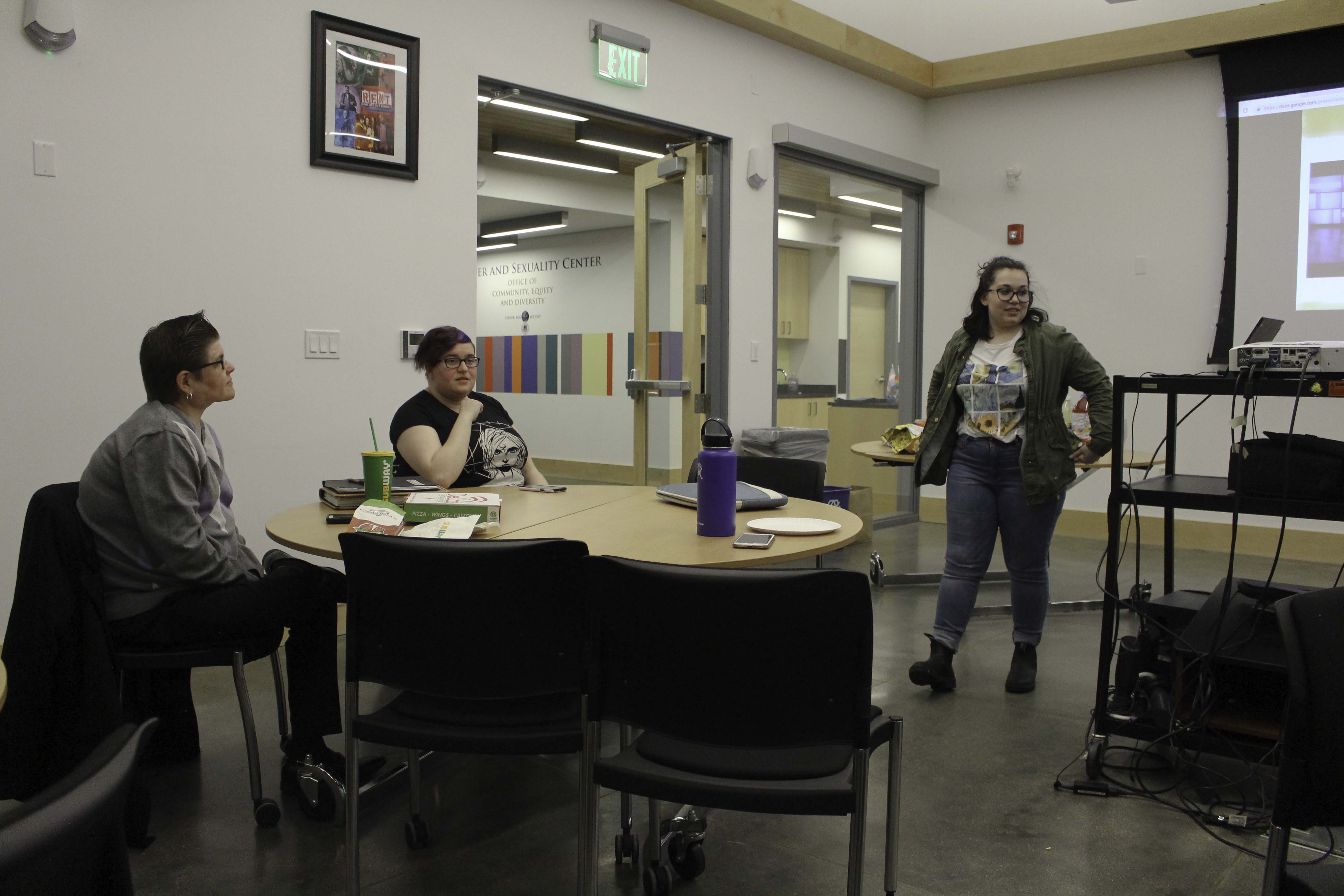(Left to Right) GSC Director Annie Russell along with students Emery Chobotor-Caya and Hope Sousa attended and hosted an open talk on coming out with a screening of Ellen Degeneres’ sitcom.
On Tuesday, March 5, the Gender and Sexuality Center held a screening of the “Puppy Episode” from the ‘90s sitcom “Ellen.” In this monumental episode, Ellen Degeneres made history by becoming one of the first celebrities ever to come out on television.
This screening was part of the Gender and Sexuality Center’s 24th Annual LGBTQ+ Symposium event. The theme of this year’s symposium is “Express Your Legacy.” Throughout the month of March, the Gender and Sexuality Center will be holding events informing about the history and expressing pride towards the LGBTQ+ community.
“There is a lot of history involved that we take that into consideration when planning events,” said Hope Sousa, a junior political science and gender and women’s studies major and civic director for the Gender and Sexuality Center. “We try to balance out history academic stuff with fun stuff. It is great for the URI community to get involved and learn new things and meet people that they haven’t met before. It is a great opportunity to have this sort of event regarding a community that is not talked about as much.”
In 1997, Ellen Degeneres’s character, Ellen Morgan, infamously came out as a lesbian on the Ellen Show. Simultaneously, in her personal life, Degeneres confirmed what people has been speculating for decades on the cover of TIME magazine. The headline read, “Yep, I’m gay,” accompanied by a picture of Degeneres posing across the cover.
Degeneres’s received massive amounts of backlash by making her sexuality public. The public outraged caused her sitcom to be canceled, leaving her out of work for nearly five years.
The backlash spread to Oprah Winfrey who had acted as the therapist on the “Puppy Episode.” Winfrey, who at the time was one of the most beloved celebrity personalities, began receiving death threats. In addition, Laura Dern, who played Degeneres’s love interest on the show, was blacklisted and could not find work for three years.
One of the discussion topics at the screening was the impact this episode had on the LGBTQ+ community.
“Before this, there were not gay people on TV, period,” said Annie Russell, the director of URI’s Gender and Sexuality Center. “And much less being the star of the show. This show was the number one show when she came out and then she lost it because she came out. It was a huge deal, especially for people like me who were closeted.”
Degeneres opened the gates of acceptance for other television shows that came shortly after, such as the popular sitcoms “Will and Grace,” “Friends,” and “Sex and the City.”
“Ellen is a monumental figure of the LGBTQ community,” said Sousa. “She was the first celebrities to ever come out publicly on television. It was really a changing point for the community because before that we hadn’t really seen much representation at all in the media. So when Ellen came out it was a pretty big deal.”
Sousa believes that having a Gender and Sexuality Center and holding events for the LGBTQ+ community is very important on campus.
“On a college campus a lot of people are leaving home for the first time and they might not have had the option to be their authentic selves at home,” Sousa said. “So they might be lost looking for a place to go or figuring out how to live their lives they way they want to. Having these resources is really crucial for college students because they might not have the opportunity to get them anywhere else. We can guide them in the right direction for whatever they are looking for.”
The University of Rhode Island is also making it easier for those in the process of transitioning genders. Starting next fall, the name-changing system on Ecampus is being revamped so students who are looking to change their names will be able to do so. In addition, students will be able to enter their preferred pronouns on Ecampus, so faculty members will be able to refer to them correctly.





